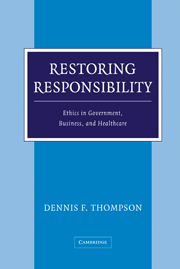Book contents
- Frontmatter
- Contents
- Acknowledgments
- Restoring Responsibility
- Introduction: The Need for Institutional Responsibility
- PART I DEMANDS OF INSTITUTIONAL POLITICS
- 1 The Problem of Many Hands
- 2 The Responsibility of Advisers
- 3 Bureaucracy and Democracy
- 4 Judicial Responsibility
- 5 Representatives in the Welfare State
- PART II VARIETIES OF INSTITUTIONAL FAILURE
- Part III EXTENSIONS OF INSTITUTIONAL RESPONSIBILITY
- Credits
- Index
4 - Judicial Responsibility
Published online by Cambridge University Press: 29 January 2010
- Frontmatter
- Contents
- Acknowledgments
- Restoring Responsibility
- Introduction: The Need for Institutional Responsibility
- PART I DEMANDS OF INSTITUTIONAL POLITICS
- 1 The Problem of Many Hands
- 2 The Responsibility of Advisers
- 3 Bureaucracy and Democracy
- 4 Judicial Responsibility
- 5 Representatives in the Welfare State
- PART II VARIETIES OF INSTITUTIONAL FAILURE
- Part III EXTENSIONS OF INSTITUTIONAL RESPONSIBILITY
- Credits
- Index
Summary
Judges are not responsible to citizens in ways that most other officials are. Judges are supposed to protect basic values of justice from infringement by citizens and other officials, and are therefore supposed to act independently of any political influence. On this view, judges exercise responsibility simply by preserving their independence. Yet judges often make decisions that are, in effect, no different from the policies that other officials make. In such cases, democracy would seem to require that judges be held accountable by citizens and their representatives. On this view, we need a more politically robust concept of responsibility – one that would require judges to interact with citizens more than they do now. This kind of judicial responsibility may conflict with judicial independence as usually understood.
The tension between the more democratic forms of responsibility and the standard types of judicial independence cannot be so easily resolved as the conventional approaches to the problem assume. The most common way that theorists deal with the tension is to accept the idea that judges should be independent so that they can protect basic values of justice, but then to seek a foundation for those values that would obviate the need for the responsibility that democracy requires of other officials. The Constitution, substantive justice, and the democratic process are the most prominent foundations offered. The objections to these approaches are well known and need not be repeated here. Although the objections cannot be expected to settle the question on such a longstanding dispute, they provide a reason to consider a different approach – one that tilts more toward democratic responsibility than judicial independence.
- Type
- Chapter
- Information
- Restoring ResponsibilityEthics in Government, Business, and Healthcare, pp. 71 - 98Publisher: Cambridge University PressPrint publication year: 2004
- 1
- Cited by



